| Books |  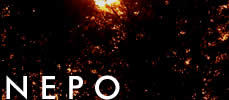  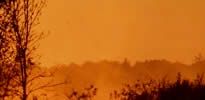 |
|
The Endless Practice Atria Books, Simon & Schuster, NY, August 2014 Order from an online bookseller: Amazon Available as an audiobook from Simon & Schuster, August 2014
CITED BY SPIRITUALITY & PRACTICE AS ONE OF THE BEST SPIRITUAL BOOKS OF 2014
REVIEWS Mark Nepo has created and encoded a work of wisdom, love, truth and beauty. Reading his words will open your heart, expand your mind, and nourish your soul. Just holding this book shifted me into a state of grace. I have spent my life searching for the reason I was born. I think anyone in middle age does. Mark Nepo has been my guide in the quest. Simple and yet wildly profound, his words of clarity and, most importantly, connection, his ideas and suggestions, are ones I inculcate and metabolize daily. A poetic and marvelous invitation into presence and love. Let this book quiet your mind and open your heart, and help you live from the rhythms of your soul. Once upon a time, in a culture in grave need of wisdom, there was a humble poet named Mark Nepo. He wrote books that woke people up, made them cry and laugh, and fed their spiritual hunger. He reassured them that life is an endless and meaningful journey. "We don't arrive," he wrote, "we grow." Best of all, he offered navigational tips for the journey—ways to grow and expand, ways of handling mess and sorrow, and ways of finding love and beauty and joy. The Endless Practice brings Mark Nepo's many years of teaching and writing and musing into one potent offering. I recommend it heartily. In his deep understanding of our complicated lives, Mark Nepo says, "Love the task and work the light." I've done this ten thousand times as the curtain lifted on stage, never thinking to try to live that way after the curtain dropped, in my every day life. It wasn't until I fought my addiction and won that I realized I was in my own way, and until I put something else in front of me, the life I wanted wouldn't show up. And then one day, along with all the blessings I received, I picked up a copy of The Book of Awakening. And fourteen years later, I'm on my third copy, because as I read each day I underscore and leave my own notes. But the journey ain't over as Mark's new book, The Endless Practice, is yet another candle to light our understanding along the spiritual path called Life. Mark Nepo is a treasure. His words invariably bring me to a place of greater depth, peace of mind, and lightness of spirit. In The Endless Practice he has given us a great gift. This lovely book is a field guide to being human. This book held me in its warm embrace. Mark is a true poet of the soul, using fresh, vivid language to capture realities that are too often cast as mere clichés. What a blessing! In The Endless Practice, Mark Nepo is a kind friend, sage mentor, and fellow journeyer, walking alongside us as he observes the magnificent complexities of the human experience. The notion of an endless practice gives us hope and encouragement—that even when we trip, struggle, grieve, or feel lost, we have an opportunity to expand, and that it's through this lived experience, with all its ups and downs, that we come closer to the heart of who we were born to be. Nepo writes reflectively and poetically about the lifelong spiritual journey. His tone is intimate, his perspective mature. Mystics will delight. Mark Nepo is a master of the human condition, which he reflects back to us with deep compassion. Going from micro to macro, from the fears and weaknesses of everyday life to the sweep of human consciousness at its grandest, most inclusive and unbounded, his verbal artistry is as compelling as his spiritual vision of universal humanity. This is a life-affirming guide to the soul's awakening. This is a book to be slowly savored. Mark Nepo's The Endless Practice is the kind of spiritual book you will want to read slowly so that the wisdom and the epiphanies can simmer in your consciousness. Nepo has written a grand spiritual work that challenges us to say yes to life.
BOOK DESCRIPTION As a poet, philosopher and beloved teacher, Mark Nepo has been breaking a path of spiritual inquiry for more than thirty years. This new book explores how the soul works in the world, and how by engaging our soul in the world, we are shaped by the endless practice of becoming the person we were born to be. To bring who we are out and to let the world in is a brave and endless practice that clarifies and solidifies the gifts we are born with. These chapters explore the difficult and rewarding aspects of being human, which are often inter-related, including how to restore our trust in life, when suffering makes us lose our way; how to begin the work of saying yes to life, so it can enliven us; and how to make our inwardness a resource and not a refuge. By unfolding topics such as Exhausting the Struggle, Staying in Relationship, and The Sweet Ache of Being Alive, Nepo continues to reveal how the covenant of being and the practice of becoming strengthen both the inner life of spirit and the outer life of service in the world. At the heart of each spiritual tradition are the questions: how to be in the world without losing what matters and is living an awakened life is of any use if we don't bring what matters to bear on the world? Though every path offers company and refuge, the journey of every human being is to discover—through their personhood—their own living relationship between the soul and the world, between being and experience, and between love and service. This book helps the reader discover that essential relationship. Speaking about what led him to this inquiry, Mark says, "I believe and give my heart to the notion that spirituality is listening for and living into the soul's place on Earth. A life of spirit, regardless of the path we choose, begins with a person's acceptance that they are part of something larger than themselves. The want to know who we really are and to know the truth of our existence and our connection to a living Universe is, to me, the fundamental life-giving question that the heart commits to once opened by love or suffering. How we are led and pushed to our true nature is what spirituality and personal growth are all about." The point of experience is not to escape life but to live it. Each of us carries some wisdom waiting to be discovered at the center of our experience, and everything we meet, if faced and held, reveals a part of that wisdom. The Endless Practice is filled with universal insights and stories woven with guidance and practice, which will bring the reader closer to living their life to the fullest.
EXCERPTS BEING THE PART, FEELING THE WHOLE
GLIMPSING ETERNITY
A CONVERSATION WITH MARK NEPO ABOUT HIS NEW BOOK, What do you mean by the endless practice and what does this have to do with becoming who we were born to be? This book is an inquiry into how the soul works in the world, and how by engaging our soul in the world, we are shaped by the endless practice of becoming the person we were born to be. From the moment we open our eyes, we are meaning-seeking creatures, looking for what matters though we carry what matters deep within us. And more than the hard-earned understandings we arrive at, more than the principles or beliefs we stitch together out of our experience, how we stay in relationship to the mysterious Whole of Life is what brings us alive and keeps us alive. Everyone knows firsthand that life is messy and painful, beautiful and unpredictable. The endless practice is keeping our heart open to the whole of it. And the journey of becoming who we were born to be never ends. It's limitless, eternal. We don't arrive—we grow. In your opinion, what is the relationship between the soul and the world? I believe and give my heart to the notion that spirituality is listening for and living into the soul's place on Earth. A life of spirit, regardless of the path we choose, begins with a person's acceptance that they are part of something larger than themselves. The want to know who we really are and to know the truth of our existence and our connection to a living Universe is, to me, the fundamental life-giving question that the heart commits to once opened by love or suffering. How we are led and pushed to our true nature is what spirituality and personal growth are all about. At the heart of each spiritual tradition are the questions: how to be in the world without losing what matters, and is living an awakened life of any use if we don't bring what matters to bear on the world? Though every path offers some form of refuge, the journey of every human being is to discover—through their personhood—their own living relationship between the soul and the world, between being and experience, and between love and service. You speak about the sanctity of experience. What do you mean by this? The point of experience is not to escape life but to live it. Each of us carries some wisdom waiting to be discovered at the center of our experience, and everything we meet, if faced and held, reveals a part of that wisdom. We have a language of truth growing in our heart that only living can decode. The paradox at the center of the sanctity of experience is that while we can learn from each other, while I can quote these sages from across history and cultures as a way to affirm that we're not alone, we are left to the magnificent journey of living our own lives. One of the key chapters in the book is called "What's in the Way is the Way." Can you talk more about this? One day, after bemoaning obstacle after obstacle in my life, it suddenly became clear that what's in the way is the way. Facing the things that prevent us from making our way is the road of freedom we each must suffer in order to become authentic enough to follow the thread of what matters. Despite all our plans, learning to stay in our heart, losing our tight hold on our self, being made humble and gentle through the erosion of loss, and feeling empty enough to begin again—these are steps to finding and refinding the thread of all that matters. Often, we so furiously insist on what we want or where we think we're going that we ignore, resist or deny what life brings as the next step. All the while, truth is a seed hidden in the days until watered by what life brings us. You talk about the courage not to waste our gifts. What does this mean and how to do we do this? What does it mean to have a gift? For the lamp, the light it was shaped to carry is its gift. Without a light, a lamp has no purpose. For a person, we are shaped by experience to reveal the light we carry. For a person, how that light comes through us is our gift. We could say that for every hand, the heart it was shaped to carry is its gift. And a life cut off from the work of its heart has no purpose. Our call in the midst of our days is to discover the gift that connects our heart and our hands, to discover the light that fills the lamp of the life we are given. Once discovered, our work is to never let the light of our gift go out. While I offer many stories and examples throughout the book, how we do this is a very personal practice we each must discover as we go. You connect resilience with saying yes to life. Can you talk more about this? In the face of this gritty, mysterious, and ever-changing dynamic we call being alive, it's nothing short of heroic that we are asked to choose life and living, again and again. Not just to put a good face on things while we're here, but because saying yes to life is how the worm inches its way through earth. It's how salmon leap their way upstream. It's how flowers grow out of stone. Ultimately, resilience resides in saying yes to who we are and giving our attention to whatever is before us. We are continually challenged to learn how to ask for what we need, only to practice accepting what we're given. This is our journey on earth. As a way of being, saying yes is the ongoing dance of intimacy between our own nature and the nature of life. Saying yes is how Spirit keeps moving through us into the world. You refer to faith as a trust in the nature of the Universe more than in a set of beliefs. How can we access this kind of faith? When learning to swim, it's natural enough to resist our initial sinking in the water. We seem to be going down. And the more we struggle at the surface, the stronger the pull seems, wanting to take us under. But when we can relax into the water, we settle a few inches into the miracle of buoyancy. Amazingly, the unseen depths hold us up. This moment reveals the essence of faith. Forget all the definitions and debates. It's as simple and difficult as swimming in the ocean of experience and learning how to trust the unseen depths to hold us up. We don't have to name that depth or send messages to it or pray in the dark to it. We simply have to surrender enough to feel its buoyancy. Yet these are the most difficult two inches to travel on earth. All the spiritual traditions offer us ways to practice this kind of surrender and deep attention to being alive. What do you hope readers will take with them from THE ENDLESS PRACTICE? Every single being has an amazing, unfathomable gift that only meeting life head-on and heart-on will reveal. And we can't fully know our gift alone. We need each other to discover the gift, to believe in the gift. And then, to learn how to use it. The challenge for each of us is not to discount our gift because of the indifference of others, and not to abdicate our gift because of the various weights we're forced to carry. My hope is that readers will better know their own true nature and the depth of their own resources by being in conversation with this book and the inner terrain it opens, including how to restore our trust in life, when suffering makes us lose our way; how to begin the work of saying yes to life, so it can enliven us; and how to make our inwardness a resource and not a refuge. |



|
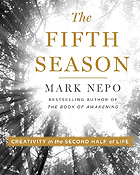
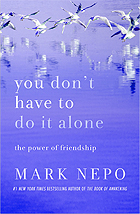
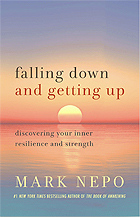
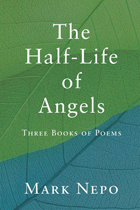
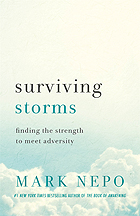
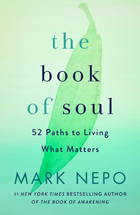
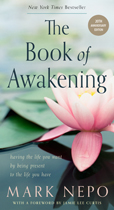

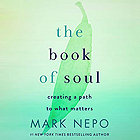
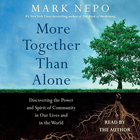
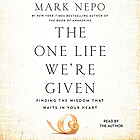
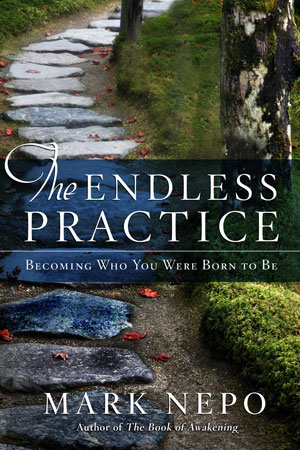
 During the last eight months of my father's life, he was in and out of hospitals and rehabilitation centers. I had flown in to see him again. When I arrived, he was sleeping and my brother said he was having a hard day. I sat by his side. When he woke, he didn't know who I was. This had never happened before.
During the last eight months of my father's life, he was in and out of hospitals and rehabilitation centers. I had flown in to see him again. When I arrived, he was sleeping and my brother said he was having a hard day. I sat by his side. When he woke, he didn't know who I was. This had never happened before.



